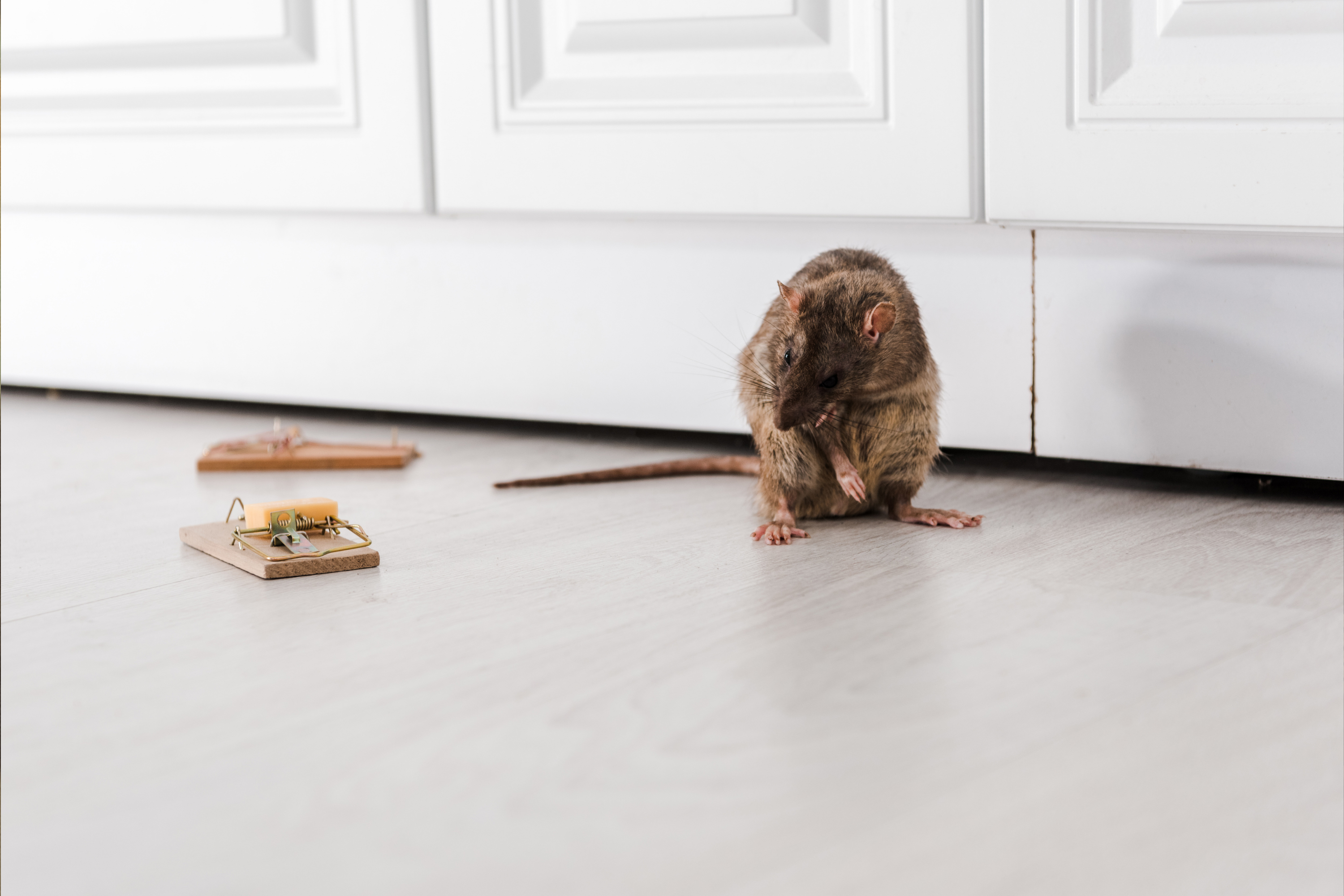Mice, as well as any other rodents, may be nice and funny but only while they stay outdoors in the wild, right where they belong.
The second these creatures find their way to your house, they become a disaster!
These tiny creatures tend to cause quite a lot of physical damage to your belongings and stuff by chewing them in the house, but this is not the only problem that comes with them. Mice are often carriers of diseases that can also be harmful for humans!
This is why so many homeowners want to know how to find mice entry points in their homes and what they can do in order to get rid of these unwanted “guests” as soon as possible.
So if you have also faced this problem recently, in this article, you will find all the answers that you might be looking for. We will tell you how to spot mice entry points in your house and what steps to take in order to cast these rodents away.
Also, you will learn about a few ways that these critters use to get into your houses and dwell there. And of course, we are going to remind you of the most common damage that mice tend to cause to our households (even though this is definitely something that almost everyone knows!).
How to Find Where Mice Are Getting In?
Once you are absolutely sure that you are not alone in your house and you also have little creatures living beside you, you definitely want to be able to spot the places that mice use for getting into your living space! However, not so many people are familiar with the ways they can make use of for finding mice entry points.
Of course, if you live in the countryside, you are definitely more than familiar with all that stuff and you can sense a tiny mouse for miles! But what if you are a citizen?
In this case, you need to learn more about finding mice entry points and how to track mice in your house (or even apartment!) if they have already found their way there.
- Inspect indoors for any holes
- Check outdoors for the holes as well
- Seal all the holes and make repairs if needed
- Clean up the yard!
Once you suspect that you have mice in your house or apartment, you need to understand that discovering their potential entry points is crucial for properly preventing a total rodent infestation.
We would suggest you begin the process with inspecting your home with a flashlight.
Take your time and look around the house, paying close attention to the areas in the home such as kitchen cabinets, baseboards, air vents, and near appliances. These are the most favorite hideouts for mice so chances are that you spot their entry ways there.
Also, check your house from outside.

Look for any gaps in the foundation, around the garage, and near pipes, gas lines, or electrical wiring.
It does not matter whether rodents live in a hidden nest or not in your home, they have to come out of it anyway simply to feed! And since mice can fit themselves through even the narrowest holes, make sure you inspect the following spots properly for any open holes, gaps, or broken seals:
- Kitchen cabinets
- Baseboards
- Behind/around appliances
- Around doors and windows
- Near air vents
- Under pipes or near drains
- In the basements or crawl space
Also, to find out how these rodents are getting inside, check out these spots:
- Gaps in the foundation
- Around pipes, gas lines, or electrical wiring
- Through the garage
- Under worn-out weather stripping
- Via the attic or roof
- Through vents and airways
So now you have a brief description of the process of spotting mice in your home, as well as the list of their most common entry spots.
And now, we would like you to familiarize yourself with how you could seal your house and protect it from mice getting in whenever they feel like.
How to Protect Your House From Mice?
If you have already found any holes and gaps, it is the right time to close the gates! Fortunately, doing it is pretty simple. For example, you can stuff all the small holes using steel wool. It will provide an abrasive and chew-proof barrier that rodents won’t be able to deal with.
Any gaps or large holes must be treated with more attention and sealed with caulking, as well as repaired using concrete. You can also patch them with metal sheeting or screens. To protect doors and windows, worn-out weather stripping can be replaced around.
Also,make sure that all of your pipes, cracked foundation, or other structural gaps are fixed and repaired since mice often come in being attracted by water.
Your yard will also need some of your care and attention! Dry leaves, unkempt bushes, food that you store in the garage, and even pet water can all provide shelter, food, and water for these rodents! So you should take some time and clean up all the things that are attracting them to enter.
Check your trash bins as well since they must have tight-fitting lids!
Common Entry Points For Mice
To be able to find mice in your house, you need to know where they can get into it from.
In the majority of cases, when these creatures get into a house, it is usually a matter of a small gap or a crack that can be found either in your foundation, or in the outer walls, attic area, etc.
To spot those entry points, we would recommend you start by doing a detailed inspection of the outside of your home. Look at your foundation to see if there are any cracks or gaps where a rodent could squeeze through.
Remember that mice are tiny and they are able to squeeze their bodies even through the narrowest holes!
Where it is possible, climb underneath the porches and look behind the stairs, bushes. In such places, there are often holes that have enlarged over the years either by water damage or by…chewing pests! Make sure that you look in the areas where pipes, wires and other objects enter your exterior walls and make sure there are no gaps there.
In addition, be careful to examine all of your screens on windows and doors for tears or holes, and inspect all of your door sweeps. Like this, you will make sure that all of them make a good seal.
What Damage Can Mice Cause to Our Homes?
Everyone knows that rodents cause serious damage to a household, but we find it necessary to remind you of the most possible hazards that tiny mice can bring with them if you let them do so.
- If mice are scratching and bumping inside the walls, it can cause significant sleep loss, especially if you are a light sleeper. If this is going on constantly, bad sleep can cause other issues.
- Mice will chew on everything from plastic to cardboard in your house. If you value your belongings, you should never allow mice to stay.
- Mice also chew on the structure of a home. They make holes in walls bigger and pull out insulation.
- When mice come, they usually carry other pests such as ticks, fleas or mites. That means you will have another huge set of problems!
- Mice droppings and the bacteria on their fur can lead to the spread of illnesses including rat bite fever, leptospirosis, and plague.

Why Is It So Difficult To Get Rid Of Mice In Your Household?
This is quite a common question from many homeowners, both from those who live in the countryside and in a city. Once you get mice in your house, they seem to be nearly impossible to get rid of! People often complain that, no matter what they do and how hard they try, these critters still either come back again and again, or they manage to hide somewhere to come out later again.
But why is it happening? Why is it so damn difficult to get rid of mice once they make their way to your household? Let’s try to figure this out.
- First of all, you need to keep in mind that mice are nocturnal creatures and they mostly hide in their nests during the daytime. In broad daylight, they can only crawl out to get some food or water which still happens quite rarely! This is why we mostly just hear them squeaking and scratching.
- Also, mice are durable beasts. To survive, they have learned to foretell the coming danger and hide or leave their living areas (for instance, when people are going to poison them), only to later come back when the danger is gone.
- Finally, mice are pretty hard to catch unless you are a cat! They are quick and move very fast which makes it nearly impossible for humans to catch one or especially kill. At this point, you may try to capture or kill mice by using traps or lure them out of the walls with food bait.
However, traps may often be ineffective, especially if you incorrectly place them, which happens pretty often.
This is why it is strongly recommended that you hire professional mice exterminators in order to deal with the rodent infestation in your house.
This will cost you more, of course, but on the other hand, you will be sure that mice will disappear once and for all.

Things You Can Do In Order to Prevent Rodents From Finding a Way to Your House
To keep mice out of your home, make sure that you keep them away from your yard. Remove the objects that don’t belong there. The fewer hiding places, the better. Also, remove all the weeds and tall grass, as well as food or water sources.
Finally, seal up your house! All the gaps, cracks, or holes must be repaired or sealed with a caulking gun, cement, or some other sealant.
- Fix any leaky outdoor faucets to not provide pests with a water source.
- If you see any signs of mice being present in your home, have a professional do the inspection for you.
- Try to keep your gutters free of debris.
- Keep shrubs and tree branches trimmed to exclude the access to your home.
- Don’t leave pet food or water outside at night.
- Tightly tie trash bags and keep the lids to your trash cans secured.
- Keep a tidy home, especially in the kitchen.
- Store all of your food in metal or glass containers. Like this, you will not be providing rodents with a free buffet.
- Make sure all drain pipes are secure and not broken like vents in an attic or wall.
We hope that all these tips and life hacks will be helpful for you in terms of finding where mice or other rodents are coming into your home from.
If you take time and follow all the recommendations precisely, you can significantly decrease the risk of having these critters in your home.
But even if, for some reason, they appear, you can always call an exterminator to deal with mice infestation!
[wp-faq-schema title=”Frequently Asked Questions”]
